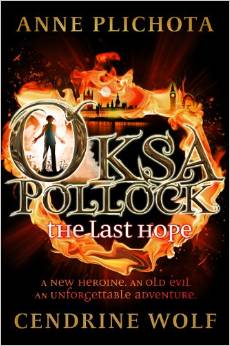posted by Simon Kemp
I’ve written a couple of posts in the past on the particular challenges faced by the poor French translator of the Harry Potter saga, dealing with J. K. Rowling’s wordplay, funny names and made-up magical terms. So I was interested to come across this article by the British translator, Sue Rose, who’s had almost precisely the opposite challenge: translating the French fantasy novels in the Oksa Pollock series into English.
Here’s an extract from the article, in which she talks about finding equivalents in English for the made-up French words in Oksa’s world:
It was a hugely enjoyable challenge to introduce English teenagers to Oksa Pollock, the loveable French heroine with incredible magic powers. Being a translator is like putting on Harry Potter’s Cloak of Invisibility or wearing a layer of Oksa Pollock’s Invisibuls — you don’t want anyone to see you’re there. You need to stay out of sight so that the reader has no idea how much blood, sweat and tears have gone into the mix.
While trying to stay invisible, you also have to navigate what feels like a lengthy obstacle course! The first set of walls I had to clamber over was the names of the many adorable, quirky creatures that inhabit Oksa’s world. These were plays on words in French, which meant they couldn’t be left as they were because an English speaker wouldn’t get the joke. I’d take a long run up and launch myself at one of these walls, get half way up, then fall flat on my back. It was totally exhausting! Some of the names were really tough to beat! Here are a few examples to show how I finally overcame the obstacles they presented:
Lunatrix and Lunatrixa: the French—Foldingot and Foldingote—is a combination of “foldingue” (crazy) and “dingo” (nutcase). There are girl and boy Lunatrixes, which in the French is shown by the “e” ending for the girl, so whatever I came up with had to be able to be varied for male and female. We often add “ess” in English to a name to show they are female, as in Prince and Princess, but that didn’t work here. What I came up with was Lunatrix, which is a combination of loony (since they’re crazy little characters) and tricks (for their weird abilities and the tricks they always have up their sleeves). They also have very large, moon-like, eyes so the first part of the name sounds like “lunar”, which relates to the moon. It was then easy to add an “a” on the end to make the female form.
Croakette: the French—Grenette—combines “grenouille” (frog) and the suffix “ette” which refers to a small version of something in both French and English. I was very happy with “Croakette”, which combines “croak” (the sound a frog makes) with “ette”. I also liked the way it sounded like “croquette”, as in potato croquette.
Gargantuhen: the French—Gelinotte—refers to a type of hen of normal size, although the Gelinottes in the book are massive — six feet tall. I was delighted when I came up with Gargantuhen, which plays on the word Gargantuan (which means immense or gigantic and refers to the French author, Rabelais) and is combined here with hen.
That was only the first obstacle though. There were also the names of the amazing magical powers that Oksa and the other Runaways (who had been exiled from an incredible, invisible world somewhere within this world) could use as weapons or useful tools:
Volumiplus: the French—Chuchalotte—is based on the verb “chuchoter” which means to whisper. This power allows someone to hear the tiniest sounds clearly. What I came up with was a name that combined “volume” (which is the amount of sound) and “plus” (the idea of getting louder). Volumiplus also sounded like some of the other powers like Magnetus (which I left the same in French, as it was clear what it meant) and Alpinismus (“Varapus” in the French came from “la varappe”, which means rock-climbing. I used a combination of Alpinism, which means mountaineering in many European languages and refers to the mountain range of the Alps, with the same “us” ending).
You can read the rest here.

